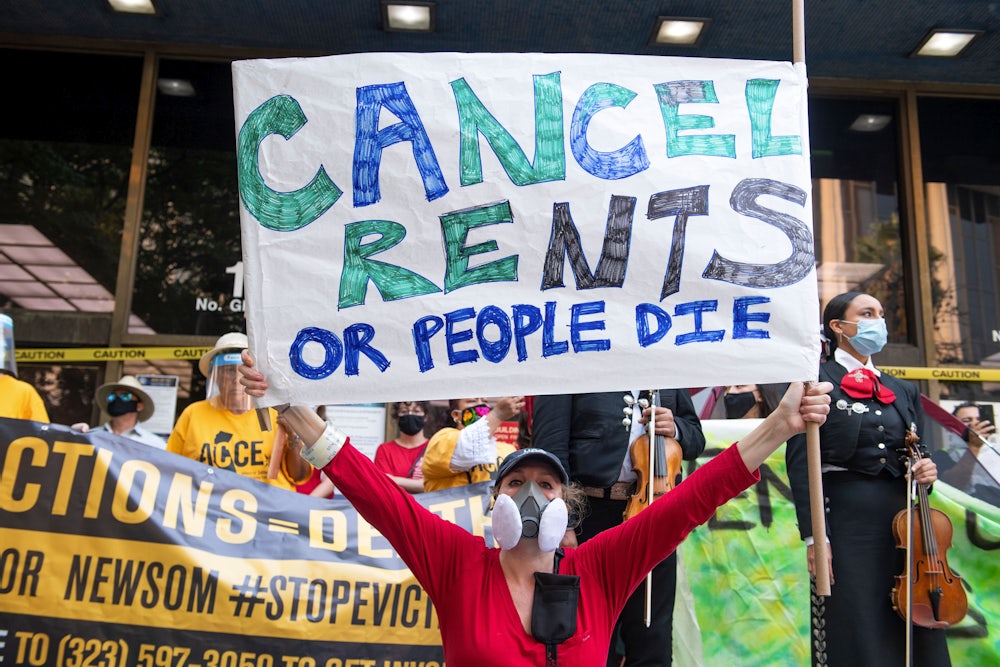Last week, seizing upon a slightly better-than-expected jobs report as proof of an economic recovery underway, Republicans once again pushed a stimulus deal to the back burner. States, whose budgets have been hollowed out by the pandemic, are now inching that much closer to fiscal collapse. As The New York Times reported on Monday, state and local governments have been forced to cut funding for public programs, schools, and cultural institutions. Without significant federal aid, those revenue shortfalls and pared-back services are likely to spell prolonged economic hardship for residents at a time when food insecurity continues to rise and millions remain out of work.
This is a crisis but not an unsolvable one. In fact, the solutions are so obvious in some cases that they can seem almost stupid. Like staving off an eviction crisis in a time of mass unemployment by canceling rent or taxing wealth-hoarding millionaires and billionaires to fill state-level budget gaps instead of killing composting programs or cutting education spending. The kind of policy that, when said aloud, makes you think: Well yeah, no duh. If there’s anything to take away from Bernie Sanders’s two presidential campaigns or the rise of lawmakers like Alexandria Ocasio-Cortez and Ilhan Omar, it’s that Democrats are at their best—and also most politically popular—when they leave behind their smartest-person-in-the-room wonkishness and fight for simple solutions that help the most people. And it’s precisely that kind of obvious policy that will help protect millions of people from economic collapse in our pandemic recession.
In New York, which is now facing a budget shortfall of about $14 billion, a group of state senators are pushing an idea that’s so straightforward that the Times recently called it “a three-word solution to many of New York’s problems”: Tax the rich. While that particular solution has been roundly rejected by Governor Andrew Cuomo, an estimated 91 percent of Democratic voters agreed even prior to the pandemic that the government should raise taxes on the wealthy. Likewise, since the beginning of the lockdowns, New York state Senator Michael Gianaris has called for a similarly uncomplicated solution to the looming eviction crisis: Cancel rent. According to Gianaris’s office and Data for Progress polling, his bill attracted overwhelming support from both voters and national politicians, including even Joe Biden. That’s because it will help people, but also because it makes sense. Rather than the edge-tinkering fixes that have defined genteel Washington policymaking for decades or the tepid, incremental changes nurtured in centrist think tanks, it’s a bill that plainly proposes what should already be obvious. Rather than imagining some future scenario in which an out-of-work person miraculously comes into $3,000 in back rent or is further indebted to their landlord through incremental payments, it solves the problem through outright debt forgiveness. Duh.
And at the national level, representatives including Ilhan Omar and Grace Meng have introduced similar bills in Congress to cancel rent and mortgages for the duration of the pandemic. For her part, Omar—who’s made a national name for herself supporting policies like Medicare for All, student loan forgiveness, and a $15 minimum wage—handily defeated a challenger in Minnesota’s August primary. If the public is skittish about heavy-handed government intervention right now, it hardly shows.
Perhaps, then, it’s the simplest ideas that might actually ameliorate the misery of the recession. According to Morning Consult, approximately 50 percent of people receiving unemployment benefits said they couldn’t afford basic expenses in August, up from 27 percent who said the same in July (which, of course, is when the $600 federal unemployment supplement expired without any additional relief in place). Former Obama adviser Jason Furman, who has advocated lowering unemployment insurance payouts based on the national unemployment rate, recently urged Democrats to settle for “President Trump’s number of $400 a week.” But I suspect that no one who’s still out of work and struggling to afford necessities takes much comfort in the fact that unemployment is all the way down to 8.4 percent. What if, as Bernie Sanders, Kamala Harris, and Ed Markey proposed early on, the government just gave people the money to make ends meet? “If we can afford to give a $1 trillion tax break to the top 1 percent and large corporations and $740 billion to the Pentagon, please don’t tell me we cannot afford to provide $2,000 a month to the working class, $600 a week to unemployed workers and expand Medicare to all,” Sanders tweeted on Tuesday.
With a national election just a few months away and an economic recession even more deeply cleaving the fates of the affluent from those of the poor, Democrats can no longer afford to style themselves as the party of a thousand technocratic tweaks. After all, Trump’s scattershot executive orders and other schemes may be reprehensible and so frequently half-baked, but rarely are they difficult to understand. Democrats should take note.
